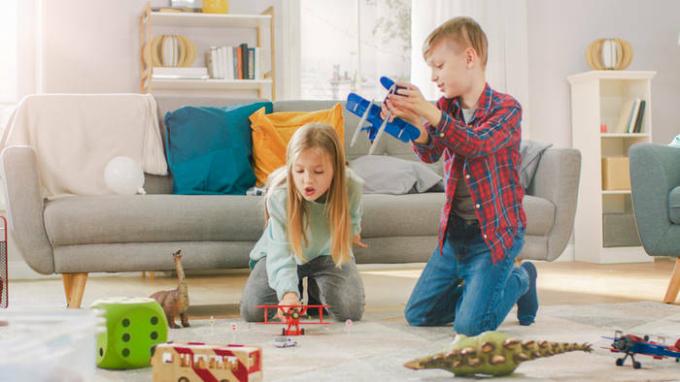Children, like adults, have every right to property and inalienable personal space.
Without respect of parents for the personal space of the child, it is impossible to talk about trust in the family.
Here are 6 rules to follow for parents who want to establish a trusting and respectful relationship with their child.

1. Donated items are the property of the child
Of course, you are offended to see how the kid has disheveled a book, thrown or broken a toy, wipes the floor with a T-shirt, because you spent time and money to buy him this thing. However, you can not take away the gift from the child, scold, threaten not to give anything else.
This item belongs to your baby. You can suggest that you should not treat her in this way, you can divert attention, offer another activity, but this is the maximum. Taking away and forbidding the use of a thing just because you don’t like how a child treats it is taboo.Put yourself in his place. Would you let someone tell you how to dispose of the gifts you received?

2. Knock at the entrance to the children's room
Even if the baby is only 3-4 years old, but he is already playing by himself in his room, be sure to knock before entering. Still young children already have a need to be alone with their thoughts, perhaps to mourn, to play alone.
If you knock on the door before you open it, you will show your child an example of what to do when he enters your room.
3. Do not use smart watches with wiretapping function
Buying a watch that helps your child listen to what is happening around him without his knowledge may seem like a good idea to parents. On the one hand, this creates a feeling of complete control over the safety of the child when he is without parents. But on the other hand, this is an absolute violation of personal space.
Think about it, how would you feel if you knew that at any moment your parents could listen in on your conversations and everything you do?
In addition, the watch only gives the illusion of control and security. You will not listen to them all the time (and if you do, you will earn paranoia), expecting that the child is about to be in danger, rushing to him at any suspicious sound. At what point the child will actually be in a dangerous situation - it is impossible to guess.To protect the child, you need to teach him the rules of safety: do not leave with strangers, do not respond to their requests for help, do not walk through abandoned and deserted places, either alone or with friends, and etc.
It is the right upbringing, timely delivered information on how to react in one or another situations, can save a child in difficult times, and not a wiretapping function that violates basic rights person.

4. Do not force your child to kiss or hug relatives
Each person reacts differently to physical contact with others: there are people who easily hug and kiss at a meeting even those whom they see for the first time, others do not like such "tenderness" even with relatives.
It is important to consider the characteristics of your child. You can’t force him: “Well, kiss your grandmother”, “Well, hug your grandfather / aunt / uncle”, etc. The child has every right not to engage in physical contact if he does not want it. You can invite him to kiss his grandmother, but you can’t be offended by refusal, scold or force.Again, bring this situation to yourself. Would you like to be required to hug or kiss someone, to sit on your knees?
If a child is taught to obey unquestioningly and make contact with adults, then this can cause a big problem if a stranger suddenly comes up to him and asks him to take his hand.

5. Provide personal space for every child
This is especially true for children of different sexes. From the age of 3-4, children may begin to be embarrassed by a parent of the opposite sex or a brother / sister. If it is not possible to settle a brother and sister in different rooms, then you need to design their common room in such a way that everyone has their own closed space.
Also remember that when a child begins to be ashamed of a parent of the opposite sex, then you should not force him and reproach him "what we did not see there." If the daughter does not want her father to bathe her, give her the opportunity to swim with her mother.
6. Don't get on your child's phone
The more anxiety and distrust you show towards your child, the more he will "close": set passwords, hang castles, to act out of spite, etc. From this, parents are even more worried and try to get into the personal space of the child - and it turns out a closed a circle.
The task of parents is to act on the warning. To bring up in such a way that the child understands why you should not get involved with bad companies, joke with the law, use alcohol and smoking, chatting online with strangers, etc. A simple "no" in this case will not work, remember yourself in this age.
The child must clearly understand the causes and consequences of undesirable actions so that there is no desire to check on himself just because the parents are against it.
If you notice strange behavior in your child, signs of alcohol or drug use, the smell of cigarette smoke, strange behavior - you need to talk honestly and kindly with the child, but do not search his things, do not read personal correspondence in smartphone.Trusting relationships are not built overnight. If the child has already grown up, and his parents did not allow him to breathe freely all his life, controlled everything and did not let go a single step, then it is not surprising if he decides to "break away" to the fullest. From an early age, it is necessary to show that you trust the child, then you do not have to worry that he has really dangerous secrets from you.
You will also be interested to read:
- 4 Parental Mistakes That Lead Your Child to Alcohol Addiction
- 6 golden rules for raising a happy child
- how to raise an ideal husband and father from a son

